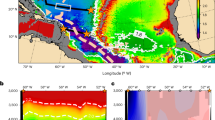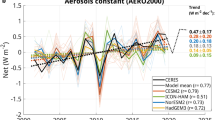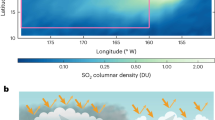Abstract
One way of accounting for lowered atmospheric carbon dioxide concentrations during Pleistocene glacial periods is by invoking the Antarctic stratification hypothesis, which links the reduction in CO2 to greater stratification of ocean surface waters around Antarctica1,2. As discussed by Sigman and Boyle3, this hypothesis assumes that increased stratification in the Antarctic zone (Fig. 1) was associated with reduced upwelling of deep waters around Antarctica, thereby allowing CO2 outgassing to be suppressed by biological production while also allowing biological production to decline, which is consistent with Antarctic sediment records4. We point out here, however, that the response of ocean eddies to increased Antarctic stratification can be expected to increase, rather than reduce, the upwelling rate of deep waters around Antarctica. The stratification hypothesis may have difficulty in accommodating eddy feedbacks on upwelling within the constraints imposed by reconstructions of winds and Antarctic-zone productivity in glacial periods.

The approximate mean latitude of the Polar Front (northern boundary of Antarctic zone) and direction of Ekman and eddy transports that control the rate of deepwater upwelling are shown (lower panel). The relevant eddy transport involves a net southward flow, as opposed to north–south mixing, and ultimately results from the tendency of lighter water to spread over denser water.
This is a preview of subscription content, access via your institution
Access options
Subscribe to this journal
Receive 51 print issues and online access
$199.00 per year
only $3.90 per issue
Buy this article
- Purchase on Springer Link
- Instant access to full article PDF
Prices may be subject to local taxes which are calculated during checkout
Similar content being viewed by others
References
Francois, R. F. et al. Nature 389, 929–935 (1997).
Toggweiler, J. R. Paleoceanography 14, 571–588 (1999).
Sigman, D. M. & Boyle, E. A. Nature 407, 859–869 (2000).
Mortlock, R. A. et al. Nature 351, 220–223 (1991).
Gnanadesikan, A. Science 283, 2077–2079 (1999).
Trenberth, K. E., Large, W. G. & Olson, J. G. J. Phys. Oceanogr. 20, 1742–1760 (1990).
Petit, J., Briat, M. & Royer, A. Nature 293, 391–394 (1981).
Visbeck, M., Marshall, J., Haine, T. & Spall, M. J. Phys. Oceanogr. 27, 381–402 (1997).
Toggweiler, J. R. & Samuels, B. in The Global Carbon Cycle (ed. Heimann, M.) 303–331 (Springer, Berlin, 1993).
Gnanadesikan, A. & Toggweiler, J. R. Geophys. Res. Lett. 26, 1865–1868 (1999).
Ganachaud, A. & Wunsch, C. Nature 408, 453–456 (2000).
Stephens, B. B. & Keeling, R. F. Nature 404, 171–174 (2000).
Keeling, R. F. & Stephens, B. B. Paleoceanography 16, 330–334 (2001).
Author information
Authors and Affiliations
Corresponding author
Rights and permissions
About this article
Cite this article
Keeling, R., Visbeck, M. Antarctic stratification and glacial CO2. Nature 412, 605–606 (2001). https://doi.org/10.1038/35088129
Issue Date:
DOI: https://doi.org/10.1038/35088129
This article is cited by
-
Increased nutrient supply to the Southern Ocean during the Holocene and its implications for the pre-industrial atmospheric CO2 rise
Nature Geoscience (2018)
-
Boron isotope evidence for oceanic carbon dioxide leakage during the last deglaciation
Nature (2015)
-
The Southern Annular Mode (SAM) in PMIP2 simulations of the last glacial maximum
Advances in Atmospheric Sciences (2014)
Comments
By submitting a comment you agree to abide by our Terms and Community Guidelines. If you find something abusive or that does not comply with our terms or guidelines please flag it as inappropriate.



